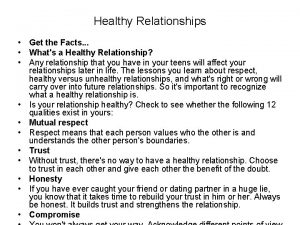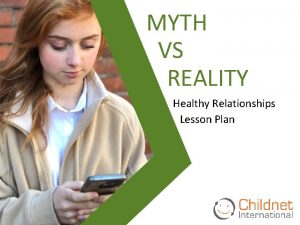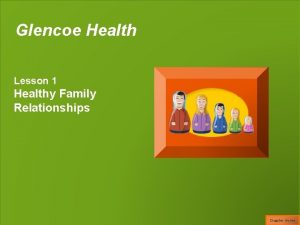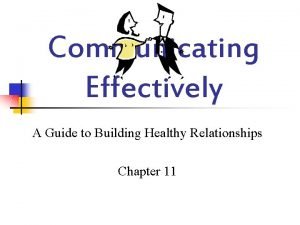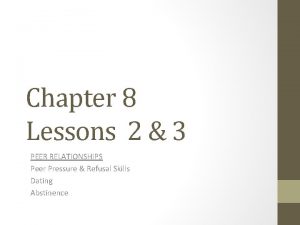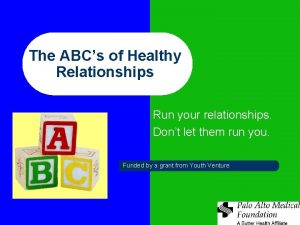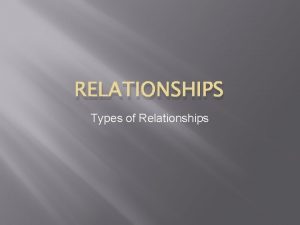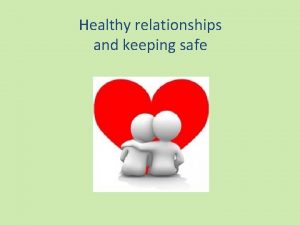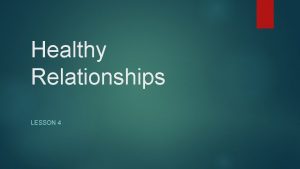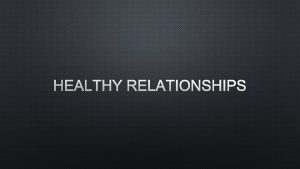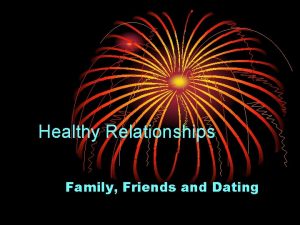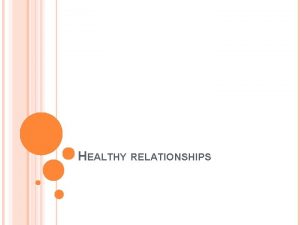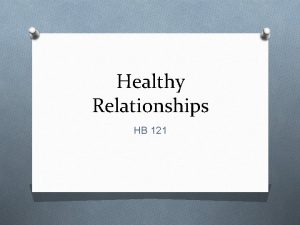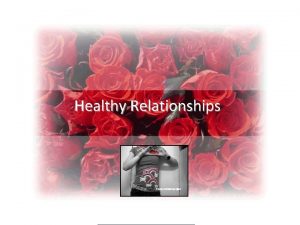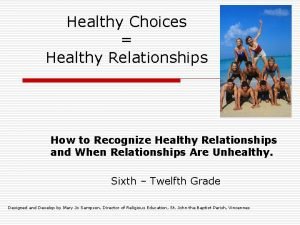Healthy Relationships Get the Facts Whats a Healthy












- Slides: 12

Healthy Relationships • Get the Facts. . . • What's a Healthy Relationship? • Any relationship that you have in your teens will affect your relationships later in life. The lessons you learn about respect, healthy versus unhealthy relationships, and what's right or wrong will carry over into future relationships. So it's important to recognize what a healthy relationship is. • Is your relationship healthy? Check to see whether the following 12 qualities exist in yours: • Mutual respect • Respect means that each person values who the other is and understands the other person's boundaries. • Trust • Without trust, there's no way to have a healthy relationship. Choose to trust in each other and give each other the benefit of the doubt. • Honesty • If you have ever caught your friend or dating partner in a huge lie, you know that it takes time to rebuild your trust in him or her. Always be honest. It builds trust and strengthens the relationship. • Compromise

• Good communication • Speak honestly and openly to avoid miscommunication. If you need to sort out your feelings first, your boyfriend or girlfriend should respect your wishes and wait until you're ready to talk. • Anger control • We all get angry, but how we express it can affect our relationships with others. Anger can be handled in healthy ways such as taking a deep breath, counting to 10, or talking it out. • Problem solving • You can learn to solve problems and identify new solutions by breaking a problem into small parts or by talking through the situation. • Fighting fair • Everyone will argue at some point, but those who are fair, stick to the subject, and avoid insults are more likely to come up with a possible solution. Take a short break if the discussion gets too heated. • Understanding • Take a minute to understand what others might be feeling-put yourself in their shoes. It can improve your communication skills, too. • Self-confidence • Having confidence in yourself can help your relationships with others.

• Get the Facts. . . • Warning Signs • Some of the following signs are just part of being a teen. But, when these changes happen suddenly, or without an explanation, these signs could signal abuse. Look out for these signs in your friends and classmates. • Warning signs of an abusive relationship • Bruises, scratches, or other injuries • Failing grades • Dropping out of school activities • Avoiding friends and social events • Indecision • Changes in clothes or make-up • Changes in eating or sleeping habits • Secrecy • Avoiding eye contact • Crying spells or hysteria fits • Constant thoughts about the dating partner • Alcohol or drug use • Anxiety and depression • Sudden changes in mood or personality

• Warning signs of an abusive person • People who are abusive in dating relationships can be affected in the long run, too: • Wants to get serious in the relationship quickly • Will not take no for an answer • Is jealous and possessive • Makes all the decisions • Dismisses other people's opinions and feelings • Wants to control a person's friends and activities • Puts constant pressure on someone • Demands to know where someone is all the time • Uses guilt trips-"If you really loved me, you would. . . " • Feels that he or she deserves unconditional love and support • Has a history of bad relationships • Blames the person for his or her feelings and actions-"You asked for it" or "You made me mad" • Apologizes for violent behavior and promises not to do it again

• Why Does Abuse Happen? • Treat others with respect. This idea may seem like common sense. After all, why not give respect if you'll get it in return? • The truth is, quite a few teens are abusive in their relationships. And many think it's justified. After all, society seems to be okay with itjust look at all the TV shows and listen to popular songs these days. Abuse is not fair, and it's not right. But there are reasons why it happens. • Abuse is related to certain risk factors • Risks of having unhealthy relationships increase for teens who: • Believe it's okay to use threats or violence to get their way or to express frustration or anger • Use alcohol or drugs • Can't manage anger or frustration • Hang out with violent peers • Have low self-esteem or are depressed • Have learning difficulties and other problems at school • Don't have parental supervision and support • Witness abuse at home or in the community • Have a history of aggressive behavior or bullying • Abuse is a choice • No matter what excuses abusers make to themselves or their dating partners for their behaviors, abuse is still their choice. They will

• Why It is So Hard to Leave • If you or someone you know is in an unhealthy relationship, it may be very hard to leave. Some of the reasons are: • Love • You may sincerely love your dating partner even if you may hate some of his or her behaviors. • Promises • Your partner may sugarcoat his or her words and promise the abuse won't happen again. • Confusion • You may be confusing genuine love and controlling love, especially if you've grown up in an abusive and unsupportive family. • Denial • You may be thinking, "It could be worse. " Trying to downplay abuse is a common reaction, but it still doesn't make the abuse right. • Guilt • You may feel like the abuse is your fault, given that your boyfriend or girlfriend is likely to blame you for it. • Fear • You may be afraid of what would happen if you told the truth. Or maybe you fear being alone and would rather be in this relationship than in none at all. • Belief you can change your partner

• Leaving the Relationship • If you're in an unhealthy relationship where you're not getting the respect that you deserve, leaving it is the best thing you can do for yourself. It will take a lot of courage and resolve, but you can do it with support from the people who care about you. • You will feel a lot better physically, emotionally, and mentally. You will finally be free of your ex's abusive and controlling behavior. • After the relationship • Just because you've left an abusive relationship doesn't mean the risk of abuse is over. Your ex may start stalking you or calling you constantly. He or she may make threats or plead with you to come back. Here are some tips to help you stay safe and have peace of mind. • Tell your parents what's going on, especially since your ex may stop by your home and demand to know where you are. • Talk with friends or adults you trust so they can look out for your safety. • Talk to school officials. They can alert school security about your ex and take other measures to make you feel safe at school. • Avoid isolated or dark areas at school and hangout spots. • Don't walk home alone. • If you go to parties or events where your ex might be, go with good friends.

• Safety Tips • These safety tips are for all persons involved in relationships, and are helpful for adolescents as well as adults. • If you are the victim of relationship abuse, don't blame yourself but do seek help: • If you are in immediate danger, contact 9 -1 -1 for help. • Talk with people you trust and seek services. Contact your local domestic violence shelter or the National Domestic Violence Hotline at 800 -799 -SAFE (7233), 800 -787 -3224 TDD or www. ndvh. org. You can also contact the National Sexual Assault Hotline 1 -800 -656 -HOPE (4673), National Sexual Violence Resource Center www. nsvrc. org , National Youth Violence Prevention Resource Center www. safeyouth. org or Love Is Not Abuse www. loveisnotabuse. com for helpful information and advice. • If you are or think you may become violent with the person you are dating, contact the National Domestic Violence Hotline at 800 -799 SAFE (7233), 800 -787 -3224 (TDD), www. ndvh. org or the National Sexual Assault Hotline 1 -800 -656 -HOPE (4673). • Recognize early warning signs of potential physical violence, like extreme jealousy, controlling behavior, or verbal threats. • Know what services are available for people involved in violent relationships in your community. • Keep a list of these services on hand in case you or a friend ever

• What is Stalking? • Stalking is a pattern of behavior that makes you feel afraid, nervous, harassed, or in danger. It is when someone repeatedly contacts you, follows you, sends you things, talks to you when you don't want them to, or threatens you. Stalking behaviors can include: • Writing letters • Damaging your property • Knowing your schedule • Showing up at places you go • Sending mail, e-mail, and pictures • Creating a website about you • Sending gifts • Stealing things that belong to you • Calling you repeatedly • Or any other actions that the stalker takes to contact, harass, track, or frighten you. • You can be stalked by someone you know casually, a current boyfriend or girlfriend, someone you dated in the past, or a stranger. Getting notes and gifts at your home, in your locker, or other places might seem sweet and harmless to other people. But if you don't want the gifts, phone calls, messages, letters, e-mails it doesn't feel sweet or harmless. It can be scary and frustrating. • Sometimes people stalk their boyfriends or girlfriends while they're

Stalking • You're not alone • 1, 006, 970 women and 370, 990 are stalked annually in the United States. • 77 percent of female and 64 percent of male victims know their stalker. • Most victims are stalked for 1. 8 years. • 82 percent of stalkers who pursued female victims followed them, spied on them, stood outside their home, place of work, or recreation; 61 percent of stalkers made unwanted phone calls; 33 percent sent or left unwanted letters or items; 29 percent vandalized property; and 9 percent killed or threatened to kill a family pet. • Get help • If you are stalked, it is not your fault. Stalkers are responsible for their behavior, not the victims. If you believe that someone is stalking you, you can: • Contact the police. • Tell your parent, friend, school principal or another person you can trust. • If you don't know where to go for help, contact us at 1 -800 -FYICALL or gethelp@nvcv. org. • Help Yourself

Here are other things you can do: • Let friends or family members know when you are afraid or need help. • When you go out, tell someone where you are going and when you'll be back. • In an emergency call 911 or your local police department. • Memorize the phone numbers of people to contact or places to go in an emergency. • Keep spare change, calling cards, or a cell phone handy. • Save notes, letters or other items that the stalker sends to you and keep a record of all contact that the stalker has with you. These items will be very useful to the police. • If you choose to tell, you should know that some adults are mandated reporters. This means they are legally required to report neglect or abuse to someone else, like the police or child protective services. You can ask people if they are mandated reporters and then decide what you want to do. Some examples of mandated reporters are teachers, counselors, doctors, social workers, and in some cases, even coaches or activity leaders. If you want to help deciding who to talk to, call our Helpline at 1 -800 -FYI-CALL, or an anonymous crisis line in your area. You might also want to talk to a trusted family member, a friend's parent, an adult neighbor or friend, an older sibling or cousin, or other experienced person who you trust. • If you want to get advice about who to talk to, call our helpline (1 -800 -FYI-CALL) or an anonymous crisis hotline in your area. You might

Cyber Bullying is a form of Abuse • Cyber Bullying FAQs • Face-to-face bullying, defined as repeated, abusive behavior toward another person, can be both physical and psychological. • Cyber bullying, however, is purely psychological, and the repertoire of tactics used in cyberspace has grown over time to include these methods: • Sending hate email messages • Creating Web sites meant to humiliate a victim • Forwarding private emails without permission • Taking an embarrassing photo or video with a camera phone and posting it on the Internet • Taking a picture or video of an individual and posting it on the web without their permission. (ie. Posting a video of someone on utube from your camera phone). • Setting up polls on Web sites to vote on who's the ____ kid in the school
 Get into/out of
Get into/out of Alliteration in one direction songs
Alliteration in one direction songs Facts about healthy relationships
Facts about healthy relationships Healthy relationships jeopardy
Healthy relationships jeopardy Healthy vs unhealthy sibling relationships
Healthy vs unhealthy sibling relationships Healthy vs unhealthy relationship scenarios
Healthy vs unhealthy relationship scenarios Relationship jeopardy questions
Relationship jeopardy questions Chapter 7 family relationships
Chapter 7 family relationships Healthy relationships communicating effectively
Healthy relationships communicating effectively Chapter 8 lesson 1 safe and healthy friendships
Chapter 8 lesson 1 safe and healthy friendships Chapter 7 family relationships
Chapter 7 family relationships A link between relationships chapter 14
A link between relationships chapter 14 Healthy relationships
Healthy relationships


